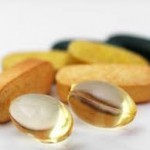 The body needs small amounts of all the vitamins to perform its essential tasks. Vitamins can be separated into two categories based on their method of absorption, either via fat or water. The fat-soluble vitamins and water soluble vitamins each have their own specific characteristics.
The body needs small amounts of all the vitamins to perform its essential tasks. Vitamins can be separated into two categories based on their method of absorption, either via fat or water. The fat-soluble vitamins and water soluble vitamins each have their own specific characteristics.
The unique characteristics of fat-soluble vitamins
As the name suggests, the fat-soluble vitamins are absorbed and stored in fat molecules and also stored inside the liver. This means that the body does not need to obtain these vitamins from food sources or other external means as frequently as the water-soluble vitamins. The excess fat soluble vitamins that are stored can be tapped as needed by the body.
Unlike water-soluble vitamins, fat-soluble vitamins cannot be expelled by the body easily and can quickly build up to toxic levels in certain circumstances. For this reason, always be careful when taking supplements containing fat-soluble vitamins. Do not take mega doses of these vitamins because it may lead to vitamin toxicity which can damage the liver and cause other health issues.
Do I need to take a fat-soluble vitamin supplement?
Most people do not need to take a vitamin supplement especially for fat-soluble vitamins. The vast majority of people in developed countries obtain all of the vitamins necessary for good health in their regular diet, and only in special circumstances would be necessary.
What are the fat-soluble vitamins?
Vitamin A
Vitamin A, retinol, is best known to the public for helping with night vision, but it is also plays a role in the development of proper bone and tooth density, and certain genetic and reproductive processes. It is also involved in the healing and promotion of healthy skin and helps to resist infections.
Natural sources of vitamin A include carrots, leafy green vegetables, and pumpkin. In developed countries, the risk of vitamin A toxicity is much greater than the risk of deficiency.
Vitamin D
Vitamin D promotes the proper absorption of calcium in the small intestine which affects bone and teeth strength and density. Milk, dairy products, and eggs are the greatest sources of vitamin D. It can also be organically produced by the body which exposure to natural sunlight, and because of this it is often referred to as “the sunshine vitamin”. Vitamin D deficiency has been linked to certain autoimmune and infectious diseases.
Vitamin E
Vitamin E is an antioxidant which prevents damage to cell membranes and fights against damaging free radicals. Vitamin E is abundant in vegetable oils such as olive and canola oil. Deficiency and toxicity levels of vitamin D is very rare, and a supplement is hardly ever needed.
Vitamin K
Vitamin K plays an essential role in the clotting of blood and a deficiency of vitamin K can result in hemorrhaging. Deficiencies sometimes appear in people who are taking certain antibiotic drugs that interfere with the vitamin. Vitamin K can be obtained in the diet through leafy green vegetables, and they can also be produced naturally in the body by bacteria in the small intestine.
Once a Day Vitamin Supplements
| Women's One Multivitamin | Opti-Men Multivitamins | Vitafusion Multi-vite |


Leave a Reply